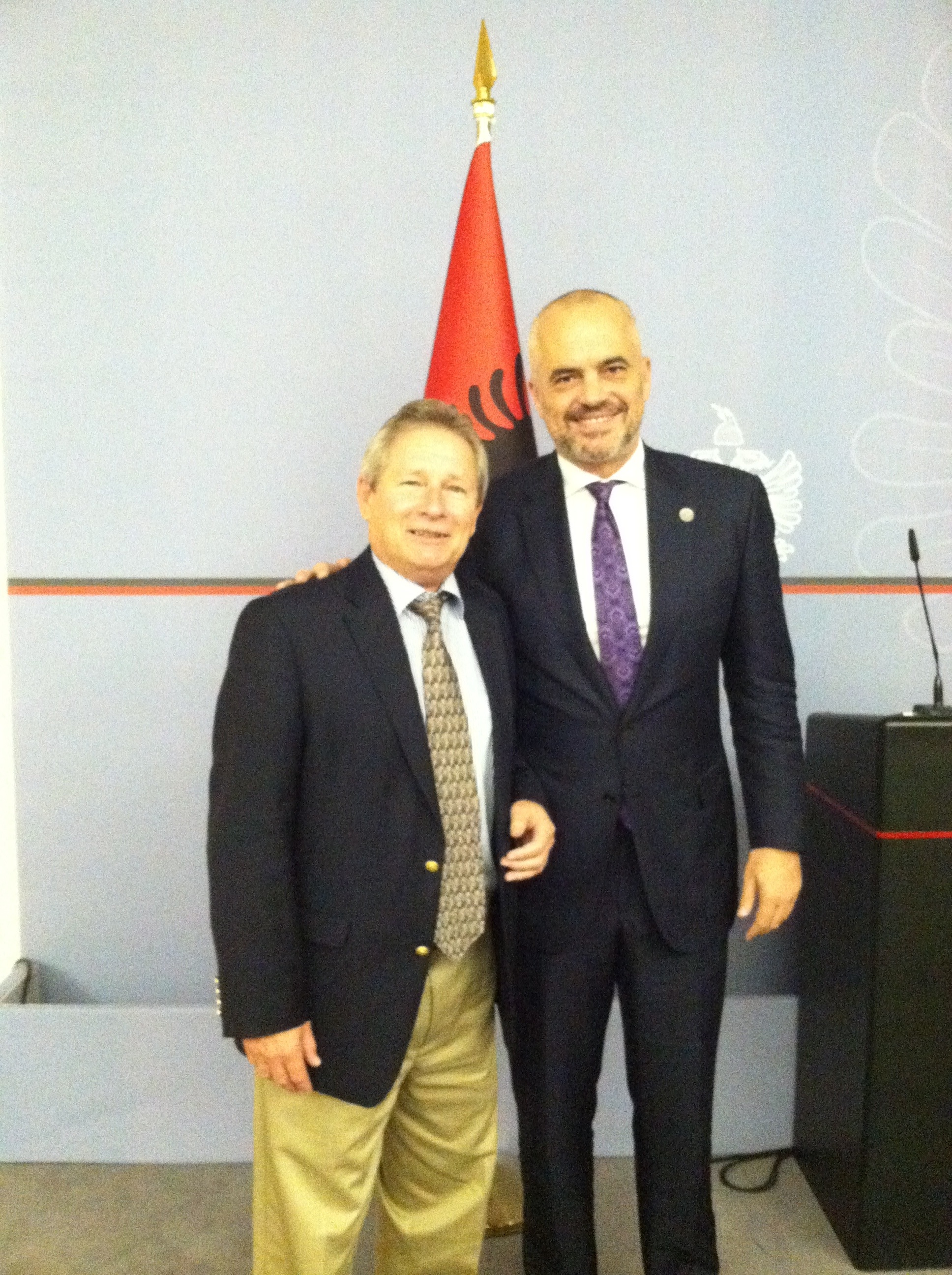Oak Harbor resident Bernd Fischer earlier this month was counted among such names as Queen Sofia of Spain and Empress Farah of Iran in attendance for the nuptials of Crown Prince Leka of Albania and Princess Elia Zaharia.
The ceremony took place Oct. 8 at the Royal Palace of Tirana in Albania’s capitol.
Of the few hundred guests present, other notable figures included Princess Irene of Greece, Prince and Princess Michael of Kent, Princess Lea of Belgium, Crown Princess Margareta of Romania, Prince George Frederick of Prussia, the Crown Prince and Princess of Serbia, Princess Lalla Meriem of Morocco, Princess Noal Zaher of Afghanistan, the Duke and Duchess of Braganza, Grand Duchess Maria Vladimirovna of Russia, the Duke and Duchess of Castro and Princess Gloria von Thurn und Taxis.
“It was glittering,” Fischer said.
“It was probably the biggest collection of European royals to assemble in the last decade.”
FISCHER, a retired professor of Balkan history and author of six books on Albania, was appointed by Prince Leka in 2006 as a special advisor to the Royal Court of Albania. Prior to that, he had spent several years cultivating an expert knowledge of the country, its people, culture and history.
Fischer first focused his studies on the small Eastern European nation while working toward his Ph.D. in Balkan studies at the University of California.
“It was totally isolated at that point,” Fischer said regarding the state of the region in the late 1970s and early 1980s.
Brimming with natural wonders, rich in culture and steeped in a complex and intriguing history, the nation of Albania is arguably one of Europe’s most noteworthy hidden treasures.
“It’s a remarkably beautiful area,” he said.
“The mountains and water are spectacular.”
Situated in the crosshairs of east and west, the nation with shores on the Adriatic and Ionian Seas has historically been at the crux of many a conflict, as embattled powers sought to conquer it. Until recently, its borders were relatively impassable to the rest of the world, as an authoritarian communist regime sought to stave off outside influences.
IN THE early 1980s, Fischer was one of few non-European travelers permitted entry, granted so based on his dual Canada-U.S. citizenship. U.S. citizens were barred until 1994, though Fischer noted that today Albania vocally and steadfastly supports the U.S., more so than any other Balkan nation, and is also a member of NATO.
That first trip was quite a remarkable one, he recalled; at that point, the nation was “about 50 years behind the times.” For example, he said, private citizens were not allowed to own a car in 1988 despite a rather “decrepit” public transportation system.
“In terms of their knowledge of the outside world, one of the ways in which the communists were very effective was in keeping information out,” he said, explaining that this had become too difficult by the late 1980s, as more modernized countries like Italy are not far away.
“Despite the communists’ attempt to pull Albania out of the 15th century, clans and tribes were still very prominent,” he said. “Who you are as a family is more important than just about anything else. The communists were just in the process of developing a national consciousness, where people would consider themselves to be Albanian rather than somebody of a particular region.”
Albania had been a part of the Ottoman Empire for 500 years, declaring independence from Turkey in 1912.
PRINCE LEKA’S grandfather, King Zog, who ruled 1922-39, was the founder of the modern state of Albania and its first king. The son of an Albanian chief, he was Europe’s only Muslim ruler, and was largely responsible for advancements that attuned the nation to more 20th century customs and ideas.
Zog was overthrown by Mussolini in 1939 when the Italians overran Albania, proclaiming it an Italian protectorate and ousting the royal family just days after the birth of his son, Leka’s father. In 1943, a communist-led resistance took control.
Prince Leka’s nuptials were not only remarkable in the unification of he and his princess; it was also the first royal wedding to take place in Albania since that of Zog and his wife, Leka’s grandmother.
Leka and his family, too, had lived in exile until their return just over a decade ago.
FISCHER, WHO visits Albania annually, said it was largely his objective and accurate biography of Zog that prompted Prince Leka to request his services as an advisor.
Albania is a monarchy, Fischer explained, but with a republic structure. The prince’s role, therefore, is more cultural than political.
Leka has consulted Fischer over the past decade in matters regarding the future of the monarchy, and what role it should possess going forward.
It is a complex but crucial question for the recently re-established monarchs, representatives of their nation and icons of culture.
Fischer noted that though there is much to be done, the nation of such harmonious religious and cultural diversity and natural splendor is ripe with promise, awaiting discovery by the rest of the world.


